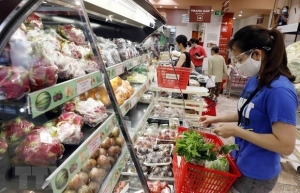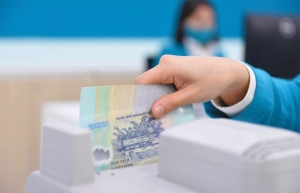More policies needed to boost business development
 |
For the second quarter in a row, the number of businesses withdrawing from the market is more than those entering. How do you explain this?
According to data published by the General Statistics Office, in the first quarter (Q1) of this year, 59,900 businesses entered the market, including 36,200 new business setups, yet up to 74,000 businesses withdrew from the market.
These businesses, either entering or leaving the market, are small, even tiny and have seldom partaken in import-export activities.
As the purchasing power in the domestic market remains weak, it is understandable why the number of businesses closing or ceasing operations was higher than those entering the market.
Do you agree with the data that indicates the domestic market has recovered?
In Q1, retail sales of goods and services picked up more than 5 per cent after excluding the price increase factor, which is only half of the growth rate seen in Q1/2023, which saw a more than 10 per cent hike. Sales of retail goods only grew by 7 per cent; accommodation and food services increased by around 13.5 per cent; and travel services saw a little more than a 46 per cent jump.
Accommodation, dining, and travel services increased sharply, mainly by virtue of international visitors.
As such, in the first three months of 2024, the country welcomed about 4.6 million international visitors, representing a 72 per cent on-year increase, thanks to a raft of stimulus policies.
The question now is; how can we maintain growth in the tourism sector, as travelling here is more expensive than to other countries in the region?
With the upcoming break on April 30 and May 1, many people are reportedly choosing to travel abroad instead of staying in Vietnam, so how can we manage this year's target of 18-20 million international visitors?
How important is it to promote the domestic market to inspire an economic rebound?
The initial stage of the development of many economies often focusses on exports, then when the economy develops to a certain extent, it turns towards propelling domestic market growth.
Currently, after a period of looking outward, China is now focusing on bolstering its internal demand. The Chinese government has crafted several policies that support people in purchasing domestically produced goods, of which, financing electric cars produced by Chinese businesses is a typical example.
In the case of Thailand, to develop the domestic market, the Thai government has decided to hand out 10,000 baht (equivalent to $275) to all citizens aged 16 and above to consume specific goods and services in a certain period of time. The total sum the Thai government is spending on stimulating the domestic market is expected to reach $14 billion.
I believe Vietnam needs similar solutions to develop the domestic market, as between 2015 and 2019, total retail sales and consumer services revenue grew an average 11.5 per cent, which is much higher compared to the growth rate in Q1 of this year.
What would you suggest to the government to boost business development?
Vietnam has applied many policies to fuel demand, by stimulating production and consumption, policies on tax exemption and reduction, particularly reducing VAT from 10 per cent to 8 per cent.
The problem is that the preferential VAT policy will expire in June, without any submissions to seek approval for its extension by the National Assembly
At its regular meeting in April, the government requested the Ministry of Finance to urgently study and submit to the government considerations on an extension of the VAT reduction, and also to have a look at corporate income tax, personal income tax, special consumption tax on domestically produced cars, and reductions on land and water surface rent and more, before April 30.
Such policies would be very practical, yet more policies are needed to encourage people to boost spending.
In addition, businesses must be supported to get bank loans more easily. Although bank interest rates have fallen to quite low levels at present, borrowing from banks is by no mean easy as one of the prerequisites to borrow is having collateral. This is proving rather hard for newly established firms or those just coming back to the market.
 | Hanoi enterprises pin hopes on domestic market to fuel growth Amid numerous challenges facing export, the domestic market has proved its attractiveness and important role, helping with Hanoi’s economic growth. |
 | Banking support to back up business development Vietnam’s central bank is taking swift action on interest rate movement to align with the government’s commitment towards supporting the business community. |
What the stars mean:
★ Poor ★ ★ Promising ★★★ Good ★★★★ Very good ★★★★★ Exceptional
Related Contents
Latest News
More News
- PM outlines new tasks for healthcare sector (February 25, 2026 | 16:00)
- Ho Chi Minh City launches plan for innovation and digital transformation (February 25, 2026 | 09:00)
- Vietnam sets ambitious dairy growth targets (February 24, 2026 | 18:00)
- Masan Consumer names new deputy CEO to drive foods and beverages growth (February 23, 2026 | 20:52)
- Myriad risks ahead, but ones Vietnam can confront (February 20, 2026 | 15:02)
- Vietnam making the leap into AI and semiconductors (February 20, 2026 | 09:37)
- Funding must be activated for semiconductor success (February 20, 2026 | 09:20)
- Resilience as new benchmark for smarter infrastructure (February 19, 2026 | 20:35)
- A golden time to shine within ASEAN (February 19, 2026 | 20:22)
- Vietnam’s pivotal year for advancing sustainability (February 19, 2026 | 08:44)

 Tag:
Tag:


























 Mobile Version
Mobile Version